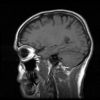| TBI Brain Injury |
Brain Trauma & Brain Injury Information |
|
|
|
|
|
Brain Functions
|
|
|
The frontal lobe, located in the front of the head is responsible for reasoning, our emotional response to events, and how we solve problems. Behind this is the parietal lobe (near the back top of the head) which handles touch and pressure as well as how we deal with temperature and pain. There are two temporal lobes located at the side of the head just above the ears, and they are responsible for hearing and memory. At the back of the brain, behind the temporal and parietal lobes, is the occipital lobe which handles our vision.
The brain stem is found deep in the skull and links the spinal cord to the brain. It handles balance, heart rate, breathing as well as blood pressure and digestion. At the base of the skull is the cerebellum which handles balance and muscle coordination. When there is a brain injury, it can affect just one area of the brain, or more commonly several areas become damaged, causing major brain function problems. Any damage to the head can lead to brain injury, as the skull, although bony and offering some protection to the brain, cannot help protect the brain in some cases of major trauma such as in vehicle accidents, or in the case of a bullet to the head.
Because of the way the world has developed, brain injuries are becoming more horrific, with vehicle accidents causing most of the brain dysfunctions. Speed can cause enormous damage to the brain, of course, and when you consider the speeds at which accidents occur, it is amazing that the brain actually survives at all. When an accident occurs, there can be closed head injuries, where the skull remain intact, or open head injuries, which result in the skull being penetrated. In many ways the closed head injuries are worse, since the symptoms from this kind of injury may take days to appear.
It is important to make notes on any changes in a person's behaviour after an accident, whether it is personality related, or action, or performance related. Any deviation to the normal behaviour of a person after an accident may indicate damage to a certain area of the brain, and the medical professionals will want to know this as soon as possible.
- head injury attorney
- head injuries in children
- brain injury
- mayo clinic health information
- traumatic head injuries
- traumatic brain injury attorneys
- brain injury attorney
- head injuries
- tbi
- brain recovery
- traumatic brain injury
- mayo clinic
- brain functions
- brain damage
- brain injuries
- brain injury attorneys
- infant head injury
- head injury lawyer
- traumatic head injury
- head injury
©
Copyright
TBIBrainInjury.com, 2008. All Rights
Reserved.
Contact
Disclaimer
Privacy
